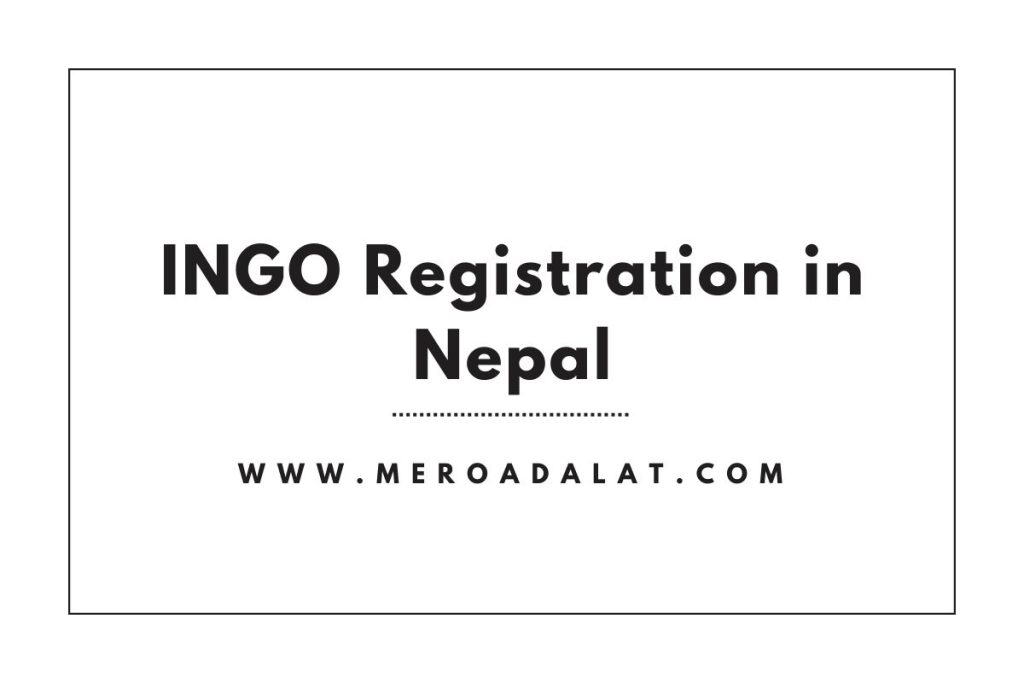This article gives you all the information regarding INGO Registration in Nepal and the complete process of registration including the documents required.
Social Welfare Act 1992, Social Welfare Council Rules 1992 and Social Welfare Council are the major Regulatory Bodies and Laws in Nepal.
Nepal has become the focus of many International Non-Governmental Organizations (INGOs) wanting to assist in its growth because of its developmental needs.
Nepal has set up a comprehensive legal framework to ensure that these INGOs align with its developmental objectives including Socialism, Poverty Alleviation, and Socio-Economic Justice as per the Constitution.

Social Welfare Act, 1992, and Social Welfare Council Rules, 1992
The “Social Welfare Act, 2049” (1992) was enacted to promote the welfare and development of vulnerable Nepalese groups. The Act establishes a Social Welfare Council to coordinate, supervise, and promote social welfare activities in Nepal.
The Council is empowered to grant permissions to foreign non-governmental organizations (INGOs) wishing to operate within the country. INGOs must apply to the Council, which evaluates their proposals based on alignment with national interests.
The Act mandates financial transparency by requiring INGOs to channel funds through local banks and submit annual reports detailing their activities.
Essentially, this Act regulates and supervises INGO operations in Nepal to ensure alignment with national sustainable development goals.
The Social Welfare Council oversees the work of international groups or organizations in the country. The Social Welfare Council regularly updates different instructions regarding topics like how to make agreements, how projects are reviewed, and how the work of international groups is evaluated and checked.
Key Steps for INGO Approval in Nepal
Seek approval from SWC
Every international organization needs approval from SWC to function effectively and legally in Nepal. This process makes sure that INGOs are helping Nepal to achieve developmental goals.
Enter into Agreements
There are two forms of agreement before approval of INGO operation in Nepal:
General Agreement
The INGO and SWC execute an agreement that lays out how the INGO will work in Nepal. It talks about important things like where they’ll help, how much money they’ll give each year, project proposal submission dates, and other must-do tasks. This agreement only lasts for a certain time and requires renewal after its expiry.
Project Agreement (PA)
The INGO, SWC, and local partners execute an agreement that talks about the details of specific projects. It covers subjects like what the project aims to do, how they’ll do it, how they’ll check on progress, and how much it might cost. It’s important for INGOs to talk with local people when making this agreement, so the project makes sense for the community and they’re on board with it.
Collaboration with Local Partners
International organizations in Nepal don’t work alone. They team up with local groups, which can be NGOs, Profit Distribution Companies, or any entity with a non-profit objective. Working together helps them get things done on the ground and understand local situations better.
Establish a local Office
International organizations in Nepal need to have a local office here. Even though this office is connected to the main organization and doesn’t stand alone legally, it still needs to register with Nepal’s tax authorities and acquire a Permanent Account Number (PAN).
Budget Allocation and Funding:
International organizations in Nepal require money to run. They have to get at least $200,000 every year from outside Nepal. Also, when they plan their budgets, they shouldn’t spend more than 20% of the total money on office and admin costs.
Required Documents For INGO Registration in Nepal
Home Country Registration: A certificate that proves the organization is authentic in its home country.
By-Laws: If the given document doesn’t clearly say what the organization’s goals are, they’ll need an extra document that does.
Financial Promise: The organization needs to show it can provide at least $200,000 every year.
Project Plan: A concept paper or proposal about what the organization plans to do.
General Agreement Draft: This needs to be in a specific format the authorities ask for.
Authorization Letter: A letter that says who’s in charge of the agreement.
ID of the Person in Charge: A copy of their citizenship, passport, and some basic info about them.
Cover Letter: With a short intro or greeting.
Funding Source Info: Details about where the organization’s money comes from.
INGO Registration in Nepal – Things to be Considered
Submission of Agreements on Time
International organizations in Nepal need to give in to the PA within three months after signing the GA. If they’re late, they might get fined, and sometimes, the GA can even get canceled.
Avoid Money-Making Businesses
International organizations in Nepal shouldn’t put money into businesses that aim to make a profit. They should focus mainly on helping and making things better.
Maintain Transparent Financial Transaction:
International organizations can give money to local groups, but they must secure SWC’s approval before accepting funds.
Conclusion
INGO registration in Nepal is a very easy process. INGO registration in Nepal guides you to register and start the organization. Nepal is open to help from international groups, but it also makes sure its own needs come first. The rules they have to make sure these groups work in a clear and organized way. It also ensures these groups team up well with local organizations and respect how things work in Nepal. These rules help Nepal grow in a way that’s good for the sustainable growth and welfare of Nepali people.
Also Read: NGO Registration in Nepal

ederation , registered in nepal. district in 2080. We work on the thematic areas; (i) Climate resilience, (ii) Disaster Risk Reduction, (iii) Capacity Development, and (iv) WASH. It has recently completed a UNDP GEF SGP funded “Managing Local Water Resources for Increasing Climate Resilience of Rural Communities”, Haripurwa-1&5,nepal We are looking for partnerships in any of the above thematic areas.
For more information, whatsapp us at 9862944100